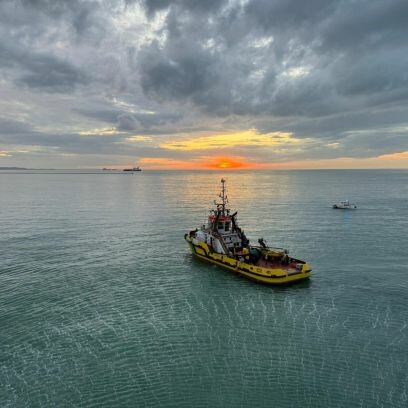OGS and Partners: Enhancing Oil Spill Response in the Adriatic Sea

National Institute of Oceanography and Applied Geophysics
The Istituto Nazionale di Oceanografia e di Geofisica Sperimentale (OGS) is leading efforts to improve oil spill risk management in the Adriatic Sea. Through the NAMIRS (2022–2024) and ASAP (2024–2027) projects, OGS and its partners aim to strengthen transnational coordination and environmental protection across six Adriatic countries.
The challenge
The Adriatic Sea is a semi-enclosed and heavily trafficked basin, making it particularly vulnerable to accidental marine pollution from oil spills. A spill in one area can quickly spread and affect multiple countries’ waters and coasts. However, existing national contingency plans are often limited in scope, lack harmonization, and do not sufficiently address the transboundary nature of such risks. There is a pressing need for a regional, coordinated approach that combines prevention, preparedness, and rapid response capabilities among Adriatic countries.
The satellite solution
To estimate the potential exposure of sensitive areas to oil in case of a spill, the NAMIRS and ASAP projects relied on oil drift simulations. These were produced using a model nested within the Copernicus Marine Service physical ocean model of the Mediterranean Sea. This downscaling approach allows higher-resolution forecasting of ocean currents in the Adriatic, increasing the precision of oil dispersion scenarios. By integrating CMEMS data with regional modeling, the projects were able to simulate likely trajectories of oil spills under different weather and ocean conditions, improving both prevention planning and emergency response readiness.
The results
- Risk maps identifying high-priority areas for protection based on maritime traffic patterns, simulations, and expert input
- Resource mapping of the North Adriatic’s anti-pollution capacities (equipment, stakeholders, services)
- Training sessions in Trieste, Rijeka, and Koper to strengthen national response teams’ capacity, particularly for shoreline cleanup and operational coordination
- Updated Standard Operating Procedures (SOPs) to streamline cross-border response
- Under ASAP, these methods and tools will now be adapted and extended to the entire Adriatic basin, fostering region-wide cooperation and preparedness
